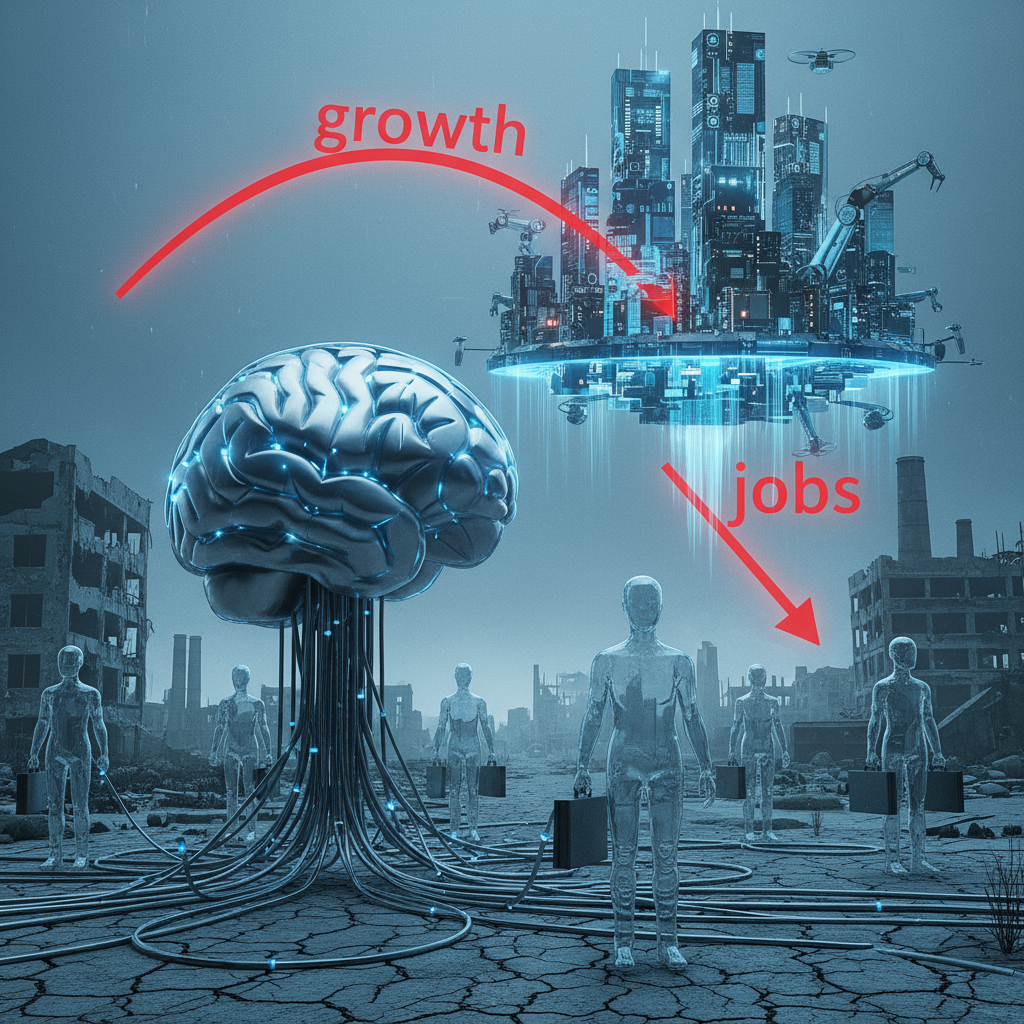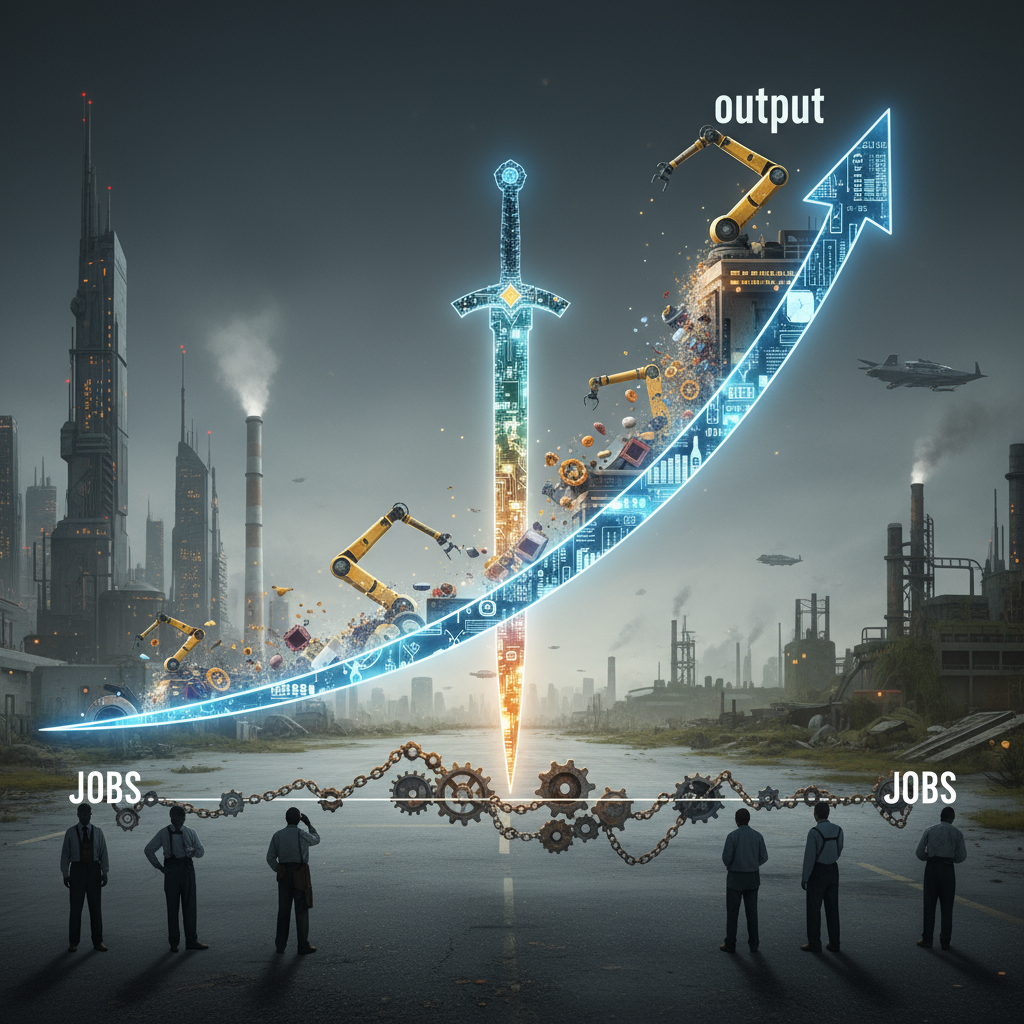The AI Paradox: Is “Jobless Growth” the Future Goldman Sachs Warns Of?

The air is thick with whispers of artificial intelligence revolutionizing our world. From optimizing supply chains to crafting compelling prose, AI’s capabilities are expanding at an unprecedented rate. While many herald this as an era of unparalleled progress and prosperity, a stark warning from an unlikely source – Goldman Sachs – paints a more cautious picture. They’ve dubbed it “jobless growth,” a future where AI fuels impressive economic output without a corresponding expansion in employment. This isn’t just an abstract economic theory; it’s a potential paradigm shift that demands our immediate attention.
The Rise of Output, The Stagnation of Jobs: Unpacking Jobless Growth

Jobless growth, also known as “decoupled growth,” describes an economic scenario where productivity and GDP increase, but the number of available jobs remains stagnant or even declines. Historically, technological advancements have often led to a temporary displacement of jobs, followed by the creation of new, often higher-skilled roles. However, Goldman Sachs is suggesting that AI’s impact might be different, potentially creating a more persistent disconnect between economic expansion and human employment.
Consider the increasing integration of AI into various industries. Automated customer service chatbots are replacing human representatives, AI-powered systems are streamlining data analysis, and advanced robotics are taking over manufacturing tasks. These innovations undeniably boost efficiency and output for businesses, leading to higher profits and a stronger GDP. However, for every task AI automates, there’s a human worker whose role might be made redundant, or whose job responsibilities are significantly altered.
The Mechanisms of Displacement: How AI Could Reshape the Workforce
The fear isn’t that AI will eliminate all jobs overnight, but rather that it will fundamentally alter the demand for human labor across broad sectors. We are already seeing glimpses of this transformation.
- Automation of Routine Tasks: From administrative duties to basic data entry, AI excels at repetitive and rule-based tasks. This impacts clerical workers, data processors, and even some accounting roles. Companies can achieve the same or greater output with fewer human hands.
- Enhanced Productivity Without Increased Headcount: A marketing team equipped with AI tools can generate more content, analyze more data, and personalize campaigns with greater efficiency, often without needing to hire additional staff. The existing team becomes more productive, but no new jobs are created.
- Rise of the “Super-Worker”: In some cases, AI might empower a small number of highly skilled individuals to perform tasks that previously required larger teams. For instance, a single architect leveraging advanced AI design software could potentially outproduce a small firm using traditional methods.
This isn’t just about manufacturing floors; it extends to white-collar professions, impacting coders, journalists, financial analysts, and even creative roles. As AI becomes more sophisticated, its ability to perform complex cognitive tasks grows, widening the scope of potential displacement.
Navigating the Future: Policy, Education, and Adaptability
If “jobless growth” becomes a reality, the implications for society are profound, far beyond just unemployment figures. It could exacerbate income inequality, put immense strain on social safety nets, and fundamentally reshape the social contract. Addressing this potential crisis requires a multi-pronged approach that anticipates these changes and prepares for them.
Policy Reforms: Governments will need to explore innovative policy solutions. This could include things like universal basic income (UBI) to provide a safety net for those whose jobs are displaced, or re-evaluating taxation structures to account for automated labor. Regulations around AI development and deployment will also be crucial to ensure ethical and equitable integration into the economy.
Education and Reskilling: Investing heavily in education and lifelong learning is paramount. The focus needs to shift towards skills that complement AI, such as critical thinking, creativity, emotional intelligence, and complex problem-solving – areas where human capabilities still far surpass machines. Reskilling programs for displaced workers will be essential to enable them to transition into new roles that emerge alongside AI.
Fostering Adaptability: Both individuals and businesses must cultivate adaptability. For individuals, this means embracing continuous learning and being open to career changes. For businesses, it involves rethinking organizational structures, investing in human capital development, and exploring new business models that leverage AI while valuing human input.
The warning from Goldman Sachs isn’t meant to inspire panic, but rather to serve as a call to action. It highlights a critical juncture in our technological evolution. While AI promises immense benefits, we must proactively address its potential societal costs. By understanding the dynamics of jobless growth, and by implementing thoughtful policies and educational reforms, we can steer towards a future where technological progress benefits all, rather than leaving a significant portion of the workforce behind. The challenge is immense, but so too is the opportunity to shape a more equitable and prosperous future in the age of AI.

